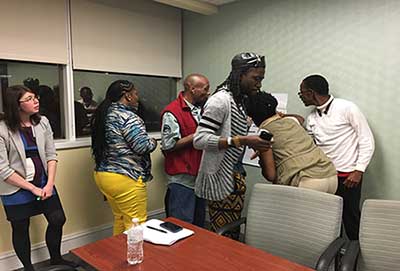Center for Leadership in Disability Investigates HIV Prevention for Individuals with Disabilities (GA UCEDD/LEND)
January 9, 2018

|
Over the past year, faculty and staff from the Center for Leadership in Disability (CLD) in the School of Public Health at Georgia State University worked with community partners to conduct a research project identifying the availability and accessibility of HIV prevention resources and services for individuals with intellectual and developmental disabilities (IDD) in the Atlanta Metropolitan Region.
The study was funded through a subaward from the Transdisciplinary Collaborative Center (TCC) in the Satcher Health Leadership Institute (SHLI) at Morehouse School of Medicine. Through a grant from the National Institute on Minority Health and Health Disparities (NIMHD), TCC supports innovative research studies focusing on addressing the unmet needs of people in communities that are disproportionately impacted by health disparities.
The need for the current study was driven by the high rates of HIV infection in metro Atlanta -- and the concern that people with disabilities including those with IDD are likely to be at increased risk due to poverty, sexual exploitation and assault, and barriers to accessing needed education and supports.
The CLD research team convened a Community Assessment Team (CAT), comprised of disability and HIV/AIDS service providers, individuals with disabilities and their families, and individuals impacted by HIV/AIDS. The research team used a community-based participatory research (CBPR) framework to conduct a needs assessment to understand the current state of HIV/AIDS prevention and services for individuals with IDD in metro Atlanta. This included interviews and empowerment evaluation tasks with CAT members, provider surveys, document analysis, and action planning next steps with community members.
The research team identified two major gaps. First, disability organizations do not consistently provide sexual health education. Second, the materials used by HIV/AIDS agencies do not meet the criteria for accessibility, including performing poorly on the CDC Clear Communication Index. Immediate implications are 1) that disability organizations need to develop and deliver sexual health programs, and 2) that HIV/AIDS agencies need to modify materials improving accessibility by using less text, writing at lower grade-levels, and providing visual content (pictures, figures) to encourage understanding. Andrew Roach, CLD faculty and Principal Investigator on this grant, concludes that "there is a pressing need for additional work in this area. Our research team hopes that the data from this initial study can guide improved services that promote sexual health for individuals with individuals with intellectual and developmental disabilities."







